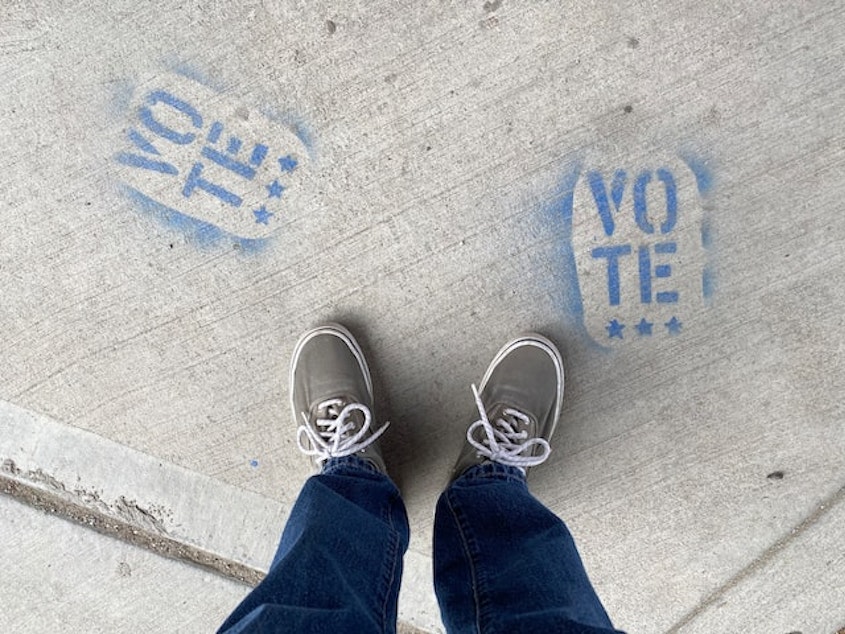Election 2022: what do Washington state voters care about most?

It's the weekend before the midterms. So, what's on people's minds as they cast their ballots ahead of Tuesday?
Stuart Elway is the director of the Crosscut/Elway Poll of Washington state voters. He spoke with KUOW's Angela King about what voters are most concerned about and how that may influence Election Day outcomes.
This interview has been edited for clarity.
Angela King: You've been polling Washingtonians in the weeks leading up to the midterms, and you've said it's like we're having two different elections. What do you mean by that?
Stuart Elway: Our last poll was in mid-September, and we asked people: what factors are you considering as you decide how to vote? That's different than asking what issues are important to voters. I wanted to broaden the lens a little bit.
So, what factors are important? What we found was Republicans and Democrats, it's like they're having two different elections. They are focused on different things. For Democrats, the top things were abortion, then party identification, then candidates' values, then climate, then the economy, then the political system. For Republicans, it was economy first, then party identification, then crime, then taxes and spending, then candidates' values. So, the lists are entirely different.
The other thing that struck me was the number two factor for both parties was party identification. This is a highly partisan election. Not surprising — most of them are now. It's become a very partisan political atmosphere, much more than it was in years past.
Just to illustrate that, we asked people: what are your finances like now compared to last year? Seventy-four percent of Democrats said they are the same or better. Sixty-nine percent of Republicans said they're worse. Now, that can't be factually true. So, the partisan lens that people are looking at politics through even here in Washington, which has historically been a sort of a less partisan state, is very strong.
Sponsored
That being said, which party has the momentum going into Tuesday's election?
Well, the race we've watched most closely has been the U.S. Senate race. It started out fairly close in January: Murray versus a generic Republican had Murray with about a three-point edge. Then, of course, it widened way out when Murray won the primary by 20 points. Now, the polling average is back down to about three points or so. There have been 27 polls in this race, and 10 of those were taken in the last month. The average has been closing all that time.
Smiley has gained about 13 points, and almost all of that has been among women, independent women. Suburban women have been the target all along in this campaign, and it looks like they may be breaking for Smiley in the Senate race and carry on down the line. So, the Republicans are back in the position of having hope here, while they were pretty discouraged in the middle of summer.
It looks like Republicans, or at least some of the Republican candidates, may be picking up some momentum. Is that right?
Sponsored
Yes. In Washington, of course, we don't register by party, so it's a fluid variable. So, I ask people every time we poll: if you had to register by party, would you register as a Republican, a Democrat, or an Independent? All of those have fluctuated. They widened, between January and July, way out in favor of the Democrats. I think that was largely the impact of the U.S. Supreme Court decision to reverse Roe v. Wade. Since then, though, the Democrats' surge hasn't been as strong. Right now, there's an 11-point edge for Democrats.
Right. Is the reversal of Roe v. Wade ancient history now?
Yes. I think there was that surge. The Democrats hopped on that, and they're still talking about Roe v. Wade in their ads two days before the election. I have the feeling they may have ridden that horse a little too long. Meanwhile, the economy hasn't gotten any better. Gas prices haven't gotten any lower. And the Republicans have been pounding away on all their ads on crime. That has worn down that Democrat surge that we saw in July and September.
Your research shows that Washington does a good job of getting eligible voters registered. It sounds like what Election Day is really going to come down to is voter turnout.
Sponsored
Yes, I think that's right. It's become such a partisan electorate that it's kind of like a game with each side motivating their voters. That's what the abortion case did for the Democrats. That's what crime and the economy is doing for the Republicans.
The old model was you would run in your primary as conservatively or as liberally, depending on your party, as you needed to. Then, you would move to the center to pick up the Independents in the general election. These days, the number of people who say they are Independent is still large here, but the number of actual Independent voters is much smaller. So, the idea is to motivate your your base, as we call it, and discourage the other team's base.
It seems like you're seeing divisions like you've really never seen before.
Yes — the finance question that I mentioned was a pretty stark example. I have the feeling now, if Republicans say that the sky is blue, then Democrats are going to say it's not.




